|
|
|
Sort Order |
|
|
|
Items / Page
|
|
|
|
|
|
|
| Srl | Item |
| 1 |
ID:
187249
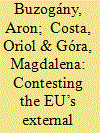

|
|
|
|
|
| Summary/Abstract |
This article analyses how populist parties in power contest the external democratization agenda within the European Union (EU)’s European Neighbourhood Policy (ENP). We present an analytical framework that conceptually unpacks both contestation and populism to argue that radical right, market liberal, regionalist and left-wing populist parties differ from each other concerning their views on external democratization. Our empirical focus is on the discursive strategies of Members of the European Parliament (MEPs) from PiS, Fidesz, Lega, Forza Italia and Movimento Cinque Stelle in European Parliament (EP) debates. The exploratory analysis reveals that populist actors rarely and selectively use the European arena for contesting democracy promotion. While an emphasis on stability and security in the neighbourhood prevails among all populist parties in our study, other considerations, such as migration policy, support for ethnic kin, suspicion towards Russia but also membership in the EP’s Party Groups inform the differences between the parties.
|
|
|
|
|
|
|
|
|
|
|
|
|
|
|
|
| 2 |
ID:
132721


|
|
|
|
|
| Publication |
2014.
|
| Summary/Abstract |
space systems play an important role in sustaining the development, prosperity and security of many nations. As more nations become critically reliant on space systems, questions of maintaining safety and strategic stability in outer space have come to the fore. Transparency and Confidence-Building Measures (TCBMs) for outer space activities have an important role to play in providing clarity about the intentions of States and in articulating norms of behaviour in outer space. TCBMs take several forms. They may be the elaboration of basic principles related to the exploration and use of outer space, political measures related to establishing norms of conduct, information-sharing activities to improve the transparency of outer space activities, operational practices which demonstrate a commitment to mutual cooperation in outer space, or consultative mechanisms. We present an analytical framework for evaluating potential TCBMs and illustrate the application of this framework to examples of potential operational, regulatory, treaty-based and declaratory TCBMs.
|
|
|
|
|
|
|
|
|
|
|
|
|
|
|
|
| 3 |
ID:
132668
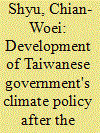

|
|
|
|
|
| Publication |
2014.
|
| Summary/Abstract |
Given its limited involvement in and recognition by international organizations, Taiwan is not presently a signatory to the United Nations Framework Convention on Climate Change (UNFCCC) or the Kyoto Protocol. The objective of this study is to analyze how and the extent to which changes in an exogenous factor, namely the Kyoto Protocol and Post-Kyoto climate negotiations, affect and ultimately lead to the formulation of and changes in the Taiwanese government×s climate policy. This study applies policy network theory to examine the development of and changes in the Taiwanese government×s climate policy. The results demonstrate that international climate agreements and negotiations play a key role in the development of, changes to, and transformation of Taiwan×s climate policy. Scarce evidence was found in this study to demonstrate that domestic or internal factors affect climate change policy. Despite its lack of participation in the UNFCCC and the Kyoto Protocol, Taiwan has adopted national climate change strategies, action plans, and programs to reduce greenhouse gas emissions. However, these climate policies and measures are fairly passive and aim to only conform to the minimal requirements for developing countries under international climate agreements and negotiations. This process results in inconsistent and variable climate policies, targets, and regulations.
|
|
|
|
|
|
|
|
|
|
|
|
|
|
|
|
| 4 |
ID:
128046
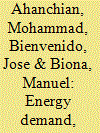

|
|
|
|
|
| Publication |
2014.
|
| Summary/Abstract |
Transportation contributes to resource depletion and has other negative impacts on the environment. The present study presents models of energy demand and environmental emissions for the land transportation sector in Metro Manila, Philippines from 2010 to 2040 using the "Long Range Energy Alternatives Planning (LEAP)" tool. The study projected energy demand and CO2, CO, HC, NOx and PM10 emissions for Business-As-Usual (BAU) and alternative scenarios and compared the results while aiming to determine optimal transportation policies to reduce energy demand and emissions. The results indicated that the adoption of EURO 4 emission standards provides the greatest reduction in energy use at 10.8%, while the best cases for the various gas emissions were split among different options. In addition, a combination of all of the alternatives is expected to lower energy use by 27.8% and to reduce CO2, CO, HC, NOx and PM10 by 30.3%, 60.3%, 59.0%, 48.2% and 66.4%, respectively. The analytical framework employed herein could be applied to other cities to evaluate and prioritize strategies to reduce future energy requirements and emissions.
|
|
|
|
|
|
|
|
|
|
|
|
|
|
|
|
| 5 |
ID:
191291


|
|
|
|
|
| Summary/Abstract |
It is widely acknowledged that the servitisation of energy retail has the potential to reduce costs and environmental impact. However, there persists a limited awareness of what market activities the energy service concept can translate into, especially in Smart Local Energy Systems (SLES). In this paper an analytical framework is developed, tested, and applied to help clarify the energy service concept, assess where its application is most appropriate in such systems, and facilitate a more strategic approach to value creation at both household and systems level to support the transition to net zero. First, we develop it through a content analysis of the energy service field's most cited papers. Second, we test its boundaries at household level through a round of interviews. Third, we demonstrate its relevance at the energy systems level by applying it in two SLES contexts. Its application revealed that focusing on value creation through material-centric energy services alone is unviable while their coordinated integration into SLES involving centralised data-centric activities creates a potential business case around network reinforcement savings and flexibility provision. For the energy service concept to succeed in the residential sector, contractual service offerings require place-based energy system integration to align with network characteristics.
|
|
|
|
|
|
|
|
|
|
|
|
|
|
|
|
| 6 |
ID:
124931
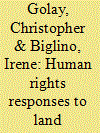

|
|
|
|
|
| Publication |
2013.
|
| Summary/Abstract |
This article approaches the debate on 'contemporary land grabbing' from a human rights perspective, focusing on one right that is particularly threatened: the right to food. It sketches an analytical framework grounded in international human rights law and the contribution such a framework can bring to the land-grabbing debate. Following a brief historical background on the right to food and its articulation in international human rights law, the paper expands on this by focusing on what can be called human rights responses to land grabbing from a right to food standpoint. The analysis considers the contributions of different actors in the human rights sphere and examines the role of the UN Committee on World Food Security and its recently adopted Voluntary Guidelines on the responsible governance of tenure of land, fisheries and forests. It also investigates how the phenomenon has been addressed by the UN human rights mechanisms, drawing on relevant practice of the UN treaty bodies and the Human Rights Council, with a focus on the Special Rapporteur on the right to food and the Special Rapporteur on the human rights situation in Cambodia. The engagement of regional human rights system with the issue of large-scale land transactions is also analysed.
|
|
|
|
|
|
|
|
|
|
|
|
|
|
|
|
| 7 |
ID:
132743
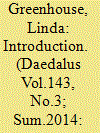

|
|
|
|
|
| Publication |
2014.
|
| Summary/Abstract |
This volume is both prequel and sequel. In 2008, Dædalus published an issue entitled "On Judicial Independence," exploring from a variety of perspectives the de½nition of that term, as well as ageold
and newly emergent threats to the ability of judges to do their work without undue constraint. Six years later, we both carry that story forward and shift the analytical frame to consider courts them selves: their past and ongoing evolution, and the work that a democracy can reasonably expect them to do. To write about courts is to write about political theory, about lawyering, about ½scal priorities, and about social welfare, as well as about courts' dependence on and independence from the body politic. The subject evokes a great variety of conversations, from the highly theoretical to the nitty gritty of service delivery for human needs in all their man - ifestations. Discussions of courts, at least in the United States, bring lawyers rapidly into view, along with criminal defendants, civil litigants, administrative agencies, budgets, public ½nancing, and popular opinion.
|
|
|
|
|
|
|
|
|
|
|
|
|
|
|
|
| 8 |
ID:
129020
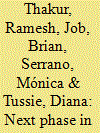

|
|
|
|
|
| Publication |
2014.
|
| Summary/Abstract |
THE KEY INSIGHT EXPRESSED IN THE STRIKING WORDS OF THE BRUNDTLAND Commission-"The Earth is one but the world is not"1-remains as relevant a political statement about most global governance challenges today as it was about sustainable development twenty-seven years ago. Global governance entails multilevel and networked relations and interactions for managing and facilitating linkages across policy levels and domains. It consists of formal and informal arrangements that provide more order and stability for a world in constant and rapid flux than would occur naturally-the range of international cooperation without a world government. Intensifying global interdependence, growing recognition of problems that defy solutions by a single state or organization, and increasing numbers and importance of nonstate actors have all contributed to the growth of global governance as an analytical framework.
|
|
|
|
|
|
|
|
|
|
|
|
|
|
|
|
| 9 |
ID:
047168
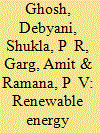

|
|
|
|
|
| Publication |
New Delhi, French Research Institutes, 2001.
|
| Description |
113p.
|
| Contents |
CSH Occasional paper No. 3/ 2002
|
| Standard Number |
09723579
|
|
|
|
|
|
|
|
|
|
|
|
Copies: C:1/I:0,R:0,Q:0
Circulation
| Accession# | Call# | Current Location | Status | Policy | Location |
| 044995 | 333.7932/GHO 044995 | Main | On Shelf | General | |
|
|
|
|
| 10 |
ID:
131759
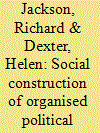

|
|
|
|
|
| Publication |
2014.
|
| Summary/Abstract |
This article proposes a general analytical framework for how we might better understand intrastate war and related forms of organised political violence. It begins by setting out our understanding of agency and structure, before outlining the key structures and agents central to the social construction of political violence. This is followed by a discussion of some of the common discursive practices frequently observed in the lead-up to the outbreak of organised violence, such as the widespread articulation of threat and victimhood narratives, the demonisation and dehumanisation of an enemy other, the renegotiation of norms of violence and the suppression of counter-hegemonic and anti-violence voices. The article argues that organised and sustained political violence is contingent on two key facilitating conditions. First, the presence of a particular set of material and discursive structures, including the military instruments for sustained violence, an economic basis for prosecuting war and a set of society-wide military norms, values and practices; and second, willing and capable agents who can transform the structural potential of the society or group into active participants in violence. The interaction of structures, agents and discursive practices can, in particular historical and spatial contexts, create the specific conditions which make organised violence possible. The discussion is illustrated by reference to a number of recent and historical wars, including the war on terror
|
|
|
|
|
|
|
|
|
|
|
|
|
|
|
|
| 11 |
ID:
172313


|
|
|
|
|
| Summary/Abstract |
“Management of complexity” was identified as a paradigm for negotiation analysis 25 years ago. Substantial progress has been made in conceptualizing complex negotiations since, although less has been accomplished with regard to operationalizing that knowledge so that tools can be developed to manage complex negotiations. This article begins by reviewing five separate theoretical frameworks of negotiation complexity and, through this analysis, identifies six significant characteristics of negotiation complexity: party numbers, negotiator roles, external environment, negotiation process, negotiation strategy, and party relations. Operational tools are identified for each variable. On the basis of this analysis, the article concludes by identifying additional tools that could be developed for managing complex negotiations.
|
|
|
|
|
|
|
|
|
|
|
|
|
|
|
|
| 12 |
ID:
131562
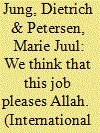

|
|
|
|
|
| Publication |
2014.
|
| Summary/Abstract |
This article explores the role of Islam in contemporary Jordanian charities and social welfare organizations. In what ways do these organizations relate to Islamic traditions in their work? What role do religious convictions play in the construction of modern selfhoods among their employees and volunteers? Do these constructions relate to broader, globally relevant, social imaginaries? The article tries to answer these questions by applying a novel analytical framework to qualitative data from fieldwork conducted among Jordanian charities and social welfare organizations. We treat these organizations as "social sites" for the reinterpretation of Islamic traditions in the context of global modernity as well as for the construction of meaningful forms of modern selfhoods among their members. In doing so, we argue that these specifically Islamic identity constructions can fruitfully be understood with reference to different types of globally relevant social imaginaries.
|
|
|
|
|
|
|
|
|
|
|
|
|
|
|
|
|
|
|
|
|